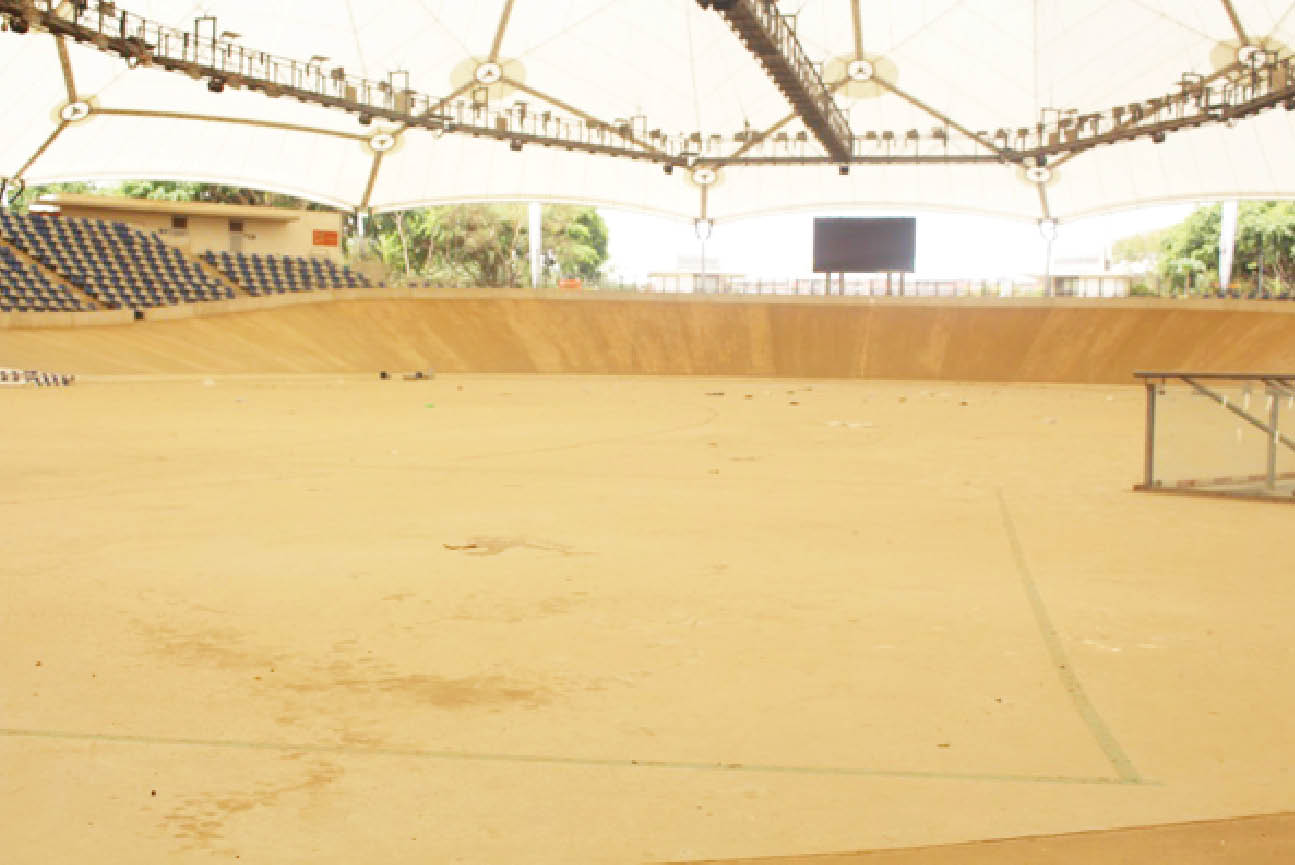In 2000, the federal government led by Olusegun Obasanjo awarded a $360 million contract to Schlaich Bergermann and Partners to build the Abuja National Stadium in the buildup to the 8th All African Games (COJA) in 2003 hosted by Nigeria.
The stadium as it stands today remains the biggest in Nigeria and was rated among the 50 most expensive stadiums in the world when it was commissioned.
The Abuja National Stadium consists of a 60,491-capacity covered main bowl, a presidential suite and viewing area, 56 corporate suites, modern turnstiles, a box office, post offices, banks and media facilities.
It also met international safety standards as there are emergency service units, closed circuit security cameras, crowd control steel fencing as well as stand-by fire-fighting equipment and metal detectors which unfortunately have either been destroyed or stolen.
Other facilities are two scoreboards and floodlights, shops and kiosks for snacks, a stand-by power supply system, a Helipad, a 3000 capacity indoor sports hall, a 2000 capacity gymnasium, a 2000 capacity swimming pool, a 4000 vehicle parking lot, an artificial lake, tennis courts, a 3000 capacity hockey stadium, a 400 capacity VIP car park, baseball, softball complex and a velodrome which was once destroyed by thunderstorm two hours before the closing ceremony of the 8th All Africa Games.
It would be recalled that Julius Berger was contracted by the government to repair the damaged velodrome. The construction giant afterwards signed a maintenance contract to maintain only the Package A of the stadium every year for N1.2bn. But when the National Sports Commission took over in 2012, N300m was appropriated for all the six national stadia across Nigeria namely Lagos, Ibadan, Enugu, Kaduna, Bauchi and Abuja and this has led to massive decay of the whole stadium.
In the years prior to the 19th National Sports Festival, the velodrome which was abandoned for 15 years was used for different purposes ranging from private events such as weddings to corporate events such as trade fairs or job recruitment exercises.
In 2008, the velodrome hosted the MTV Africa Music Awards (MAMAs) before it was turned into a storage facility.
It was gathered that the velodrome originally built for cycling events became a storage facility as it was filled with thousands of gas cylinders and stoves.
The stoves, which were allegedly purchased as election gifts by former president Goodluck Jonathan’s campaign team ahead of the 2015 elections, were kept there for about two years.
This was corroborated by an official who works in velodrome. Speaking under condition of anonymity, she said; “The velodrome is used for different activities, churches come, corporate organisations come when they have programs”.
“The last time the velodrome was used outside sporting activities was two weeks ago. They didn’t use the main hall but the mini media center. But for now, they don’t use the main hall for any other activities, only for sports,” she noted.
She however revealed that prior to the hosting of the 19th National Sports Festival, the hundreds of thousands of stoves and gas cylinders stored therein were moved out to make space for events to be held there.
Reports said another reason the stoves were moved out was for the certification of the velodrome by the Union Cycling Federation.
In a statement released by the president, Cycling Federation of Nigeria, Giandomenico Massari, in 2017, the certification was part of efforts by his administration to develop the sport in Nigeria which was being delayed then by the stoves.
In 2019 however, two sporting events were held in the velodrome – the Nigeria International Taekwondo Open and the ICC Cricket World Cup Trophy Tour Driven By Nissan.
Meanwhile, more events are lined up to take place in the velodrome.
Nigeria is set to host the first African Track Championship, genetically known as African Cup 2019 from July 27 to 28.
Speaking with reporters, Massari assured of his federation’s preparedness to ensure a successful maiden hosting of the competition.
“The infrastructure at the stadium is good enough to host the upcoming game. Aside hosting the championship, Nigeria will be the centre for West Africa and beyond in terms of training and churning out talents,” he said.
Also, the second edition of the Prudent Energy & Services Handball League is expected to kick off in April.
Our correspondent met with a top official of sports ministry who declined a formal interview but said the velodrome was built for cycling events.
He said the place had in the past been used for other purposes such as wedding receptions at the cost of N3million. He noted that the rent went straight to TSA.
A visiting to the velodrome by our reporter showed that the enter environment is dusty and dirty.
The underground facilities which are about 1.00m above the finish floor were equally dusty and dirty while some offices were under lock and covered with cobwebs.
Lack of proper maintenance of public facilities has always been a problem in Nigeria, and this has manifested in the level of decay of sporting facilities across the nation.
It is high time the government devoted resources to maintain these facilities same way huge resources were spent to build them in the first place. There are several legitimate ways to always recoup monies spent if administrators and politicians properly adjust their thinking caps.

 Join Daily Trust WhatsApp Community For Quick Access To News and Happenings Around You.
Join Daily Trust WhatsApp Community For Quick Access To News and Happenings Around You.


